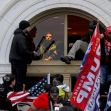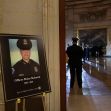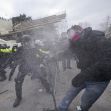Ashli Babbitt, a 35-year-old Air Force and Air National Guard veteran, San Diego resident, and ardent Trump supporter, died from being shot during the January 6 riot at the U.S. Capitol. She had entered the building in the crowd that aimed to disrupt the certification of the presidential election. After the group used a helmet and stick to smash through glass into the Speaker’s Lobby, Babbitt was shot by a Capitol Police officer while she was trying to jump through the shattered glass opening.
Three officers who had been guarding the door with no visible shields or riot gear had left to make way for a tactical team. The officer who shot Babbitt was unaware that any such team was on the way. The doors were completely unguarded while the rioters tried to break them down; he was left alone to confront a mob.
The unnamed officer was placed on leave soon after the riot while Babbitt’s death was under investigation based upon whether her shooting was a violation of her civil rights. This is standard procedure for whenever a police officer uses deadly force, the Justice Department said. The Washington Metropolitan Police Department, the U.S. Attorneys office in Washington, D.C., and civil rights prosecutors examined the shooting. Lethal force is legal if an officer has an “objectively reasonable” fear of serious harm to himself or others.
The initial determination made about the shooting was that charges against the officer were not warranted, but the investigation is not complete and Justice Department officials have not yet made their final determination. Any final charging decision would have to be approved by senior Justice Department leadership, and they haven’t been briefed on the subject yet, although their decision is expected soon.
The U.S. Attorney’s office in Washington is prosecuting the more than 150 cases that have resulted from the broader investigation into the riot that they’re leading. When they evaluate cases such as these to determine whether to bring federal charges, they must establish that an officer used excessive force and that the officer willfully violated someone’s constitutional rights. Legal experts have opined that any such case against the officer who shot Babbitt is unlikely.
The officer, a lieutenant, standing between the rioters and members of Congress, was basically the potential last line of defense. His position gives some justification for his actions. A fellow Capitol Police officer said, “That’s where he drew the line in the sand,” and added that the lieutenant is expected to return to his previous status.
The lieutenant’s lawyer, Mark Schamel of Lowenstein Sandler, said “Without question he should be cleared. There’s no way to look at the evidence and think he’s anything but a hero.”
Representative Markwayne Mullin (R-OK) witnessed the shooting. He told a reporter that there were still lawmakers and press trapped in the third-floor balcony overlooking the floor. He said, “I believe they were wanting to hurt us. My thought was, ‘How are we going to handle this one?’” Mullin said that after the gunshot “Of course, everybody got really excited again, but I’ll tell you, from my perspective, the lieutenant that did that, I truly feel that he saved some people’s lives that day.” Mullin hugged the lieutenant afterward, telling the distraught man, “Listen, you did what you had to do.”
The officer fears being retaliated against by Trump supporters.
The decision not to charge Babbitt’s shooter is controversial. Far-right activists have used her death as a rallying cry and called her a martyr for their cause. The group the Proud Boys have called her a “casualty of system aggression.”
Babbitt issued this tweet the day before the riot: “Nothing will stop us…they can try and try and try but the storm is here and it is descending upon DC in less than 24 hours…dark to light!”
Babbitt had a rap sheet that included reckless endangerment, malicious destruction of property, and tampering with a car. Two restraining orders had been taken out against her.






